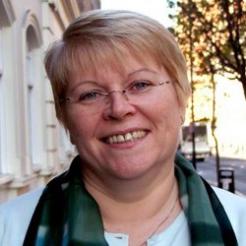If women in the voluntary sector are to achieve equality of pay and opportunity, the debate needs to move on from the “old-fashioned bra-burning era” and focus on skills, according to Acevo chair Lesley-Anne Alexander.
Alexander (pictured) made the comment during a panel discussion hosted by Bates Wells and Braithwaite yesterday to launch Rowena Lewis’s report on women leaders in the sector. Close to Parity: challenging the voluntary sector to smash the glass ceiling is the culmination of Lewis’s work as a 2010 Clore Social Fellow.
About 50 people gathered at BWB’s offices to hear panellists Beatbullying CEO Emma-Jane Cross; Clore programme director Dame Mary Marsh; Jennifer Ogole, CEO of Bang Edutainment; and Alexander discuss the issues raised in the report and consider what the sector can do to dismantle the glass ceiling.
Alexander, who is also chief executive of RNIB, said she recalled with dread the “over-zealous discussions about equality” in the public sector early in her career, and asserted: “We need a new way of framing this debate.
“There is no way we are going to make a difference if we take our debate back to that bra-burning era. I think it needs to be a discussion around skills…if we frame the discussion and what we do in terms of the old-fashioned equalities agenda we are not going to get very far.”
Jennifer Ogole warned against abandoning the more traditional campaigning routes, saying these still have value and merit, but said the sector should look at the issues and experiences of current emerging women leaders and adapt approaches and methods to better suit them.
Emma-Jane Cross said: “It is about merit, for me. I’m not a feminist, I’m an egalitarian – it’s got to be about equality for all.”
Marsh: Trustee boards too risk-averse
Dame Mary said she thought some of the problem lay with trustee boards – and women in the sector - not taking enough risks.
She said: “I worry that trustee boards don’t take enough risks when making senior appointments. The trustee board at NSPCC took a big risk when they appointed me, as I was making a pretty flying leap from what I was to what I would do.
“But trustee boards increasingly look for somebody who’s already been a CEO, and we will never get there if that is how trustee boards are going about it.”
However, she also reminded those gathered of how far women in the sector have come in recent years. She reflected on her own introduction to the sector when she became CEO of NSPCC 12 years ago following a career in teaching: “I went to my first meeting of the CEOs of large charities, at the Army & Navy Club, and walked into a room full of men. And an awful lot of them were military men. Geraldine Peacock was the only other female CEO at the time and she wasn’t at that meeting.” Soon after, a whole raft of big charities appointed female CEOs.
Dame Mary concluded by urging women in the sector to have the confidence to put themselves forward for big leadership jobs, even if the prospect scares them.








